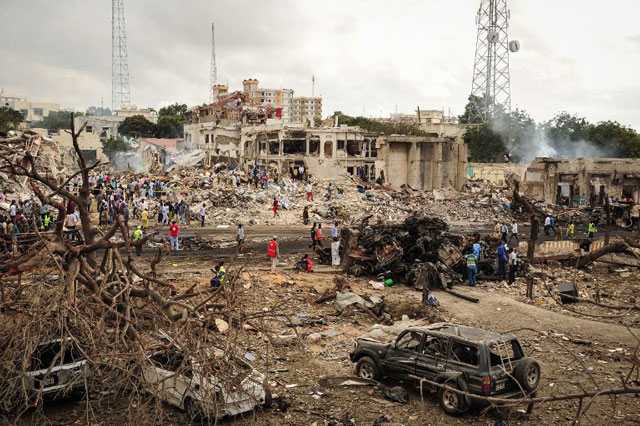
A truck bomb exploded outside a hotel at a busy junction in Somalia’s capital Mogadishu on October 14, 2017 causing widespread devastation that left many dead. AFP PHOTO / Mohamed ABDIWAHAB
Mogadishu, Somalia | AFP | The death toll from a deadly attack on a hotel in Mogadishu rose to 27 on Sunday, prompting the Somali government to sack its police and intelligence chiefs.
The move came after Al-Qaeda aligned Shabaab gunmen staged coordinated bomb attacks Saturday outside the Nasa Hablod Hotel 2 before storming the building.
Two weeks ago, Mogadishu was hit by a massive truck bombing that killed 358 people in the troubled country’s worst-ever attack.
Saturday’s carnage was unleashed when a car bomb exploded outside the hotel entrance followed by a minibus loaded with explosives going off at a nearby intersection.
The gunmen then rushed into the popular hotel, launching a siege that lasted several hours.
“Five gunmen stormed the building, two of them were killed and the rest captured alive,” security ministry spokesman Abdiasiz Ali Ibrahim told reporters.
Sporadic gunfire could be heard inside the building where the gunmen had holed up, but several people managed to escape, officials said.
Officials had initially given a toll of 14 dead, saying “most” of the casualties were civilians although a senior police official and a former MP were among them.
The Shabaab claimed responsibility for the attack in a statement on its Andalus radio station, saying it was a hotel where “apostate officials” were staying.
– ‘Serious accountability’ –
The latest toll was given by Security Minister Mohamed Abukar Islow at a cabinet meeting at which ministers approved the dismissal of intelligence agency boss Abdillahi Mohamed Sanbalooshe and police chief Abdihakim Dahir Said.
The two were “fired for the purpose of serious accountability,” said a statement, which also said police were interrogating the three captured gunmen.
The removal of the officials comes soon after the abrupt resignation of Somalia’s defence minister and army chief on October 12, both of whom quit without explanation just two days before the massive truck bombing.
Although a new army chief was named the same day, General Abdi Jama Warsame, the defence portfolio remains vacant.
– ‘Operating blind’ –
The intelligence chief’s dismissal came just three days after he published an op-ed in the New York Times criticising international partners for not responding to Somali requests for technical and training expertise to analyse forensic evidence after attacks like the October 14 bombing.
“We have been operating almost completely blind. International partners offered to provide ‘technical assistance’ but… the evidence gathered from bombing scenes is handled and removed by foreign ‘mentors’ who treat intelligence as a commodity rather than as a shared asset in our battle against a common enemy,” he wrote.
“We appealed to our international partners to share all information and evidence that they gathered from bombings in Somalia with the national authorities. The silence was deafening,” he added.
In Sunday’s statement, the information minister said five people had so far been arrested in connection with the October 14 attack.
To date, no group has claimed responsibility for that truck bombing, though Shabaab militants have been widely blamed.
The Nasa Hablod 2 is a popular hotel located in the north of the city whose sister hotel, the Nasa Hablod, was hit by Shabaab militants in June 2016, in an attack that killed 11 people, including a junior minister.
The Shabaab has made attacks on hotels — commonly beginning with a suicide car bombing followed by an invasion by gunmen — a regular strategy in its decade-long battle to overthrow successive internationally-backed governments in Mogadishu.
The Shabaab lost its foothold in Mogadishu in 2011 but has continued its fight, launching regular attacks on military, government and civilian targets in the capital and elsewhere.
 The Independent Uganda: You get the Truth we Pay the Price
The Independent Uganda: You get the Truth we Pay the Price





